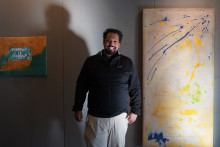Her plans have garnered nothing but positive reactions so far. 'Everyone I talk to about it reacts enthusiastically. From my hairdresser to friends in Utrecht who also want to learn it. Local language preservationists have already expressed a great deal of gratitude,' Huizing says, but she immediately tempers expectations. 'I'm still in the exploratory phase. It remains to be seen whether it will work.'
Choices
Because where do you start? What can you achieve in five lessons? What teaching methods should you choose? ‘I simply can't cover everything. My supervisor told me to start small,' says Huizing. Then there is the fact that Twents Low Saxon differs slightly from town to town. 'A well-known person Twente, whose name I am not yet allowed to reveal, is recording instructional videos for me in his own dialect, about the basic principles of the language. A good starting point, but I would like to tell students that Twents or even Low Saxon in general, is quite a bit bigger than that.'
Removing prejudices
Important for Huizing is to remove shame. 'Some pupils have quite a few prejudices about the language. You can take that away with beautiful poetry, by simply talking about it in school, but also with extra information about the history and cultural background of the language itself. So I have to choose carefully.'
'Twents is not just
a language of farmers'
Another tricky point is finding example materials. In recent decades, many poems have been written in the language, but they aren’t always suitable for teenagers or easy to find digitally. 'I look for poems that are not too heavy, or that aren’t about the good old days on the farm. I think it's important that they see Twents in a broader setting, not just as a language of farmers.'
Rap or spoken word
She has already found the Twickel College in Hengelo willing to try the course in a pilot project. 'I also want to have conversations with pupils there themselves, to gauge what they think is important.'
Potential problem: To be able to write poetry in Twents, you must first be able to speak it. That doesn’t worry Huizing. Her contact at Twickel College said there are plenty of pupils who speak it at least a bit, or are familiar with it. 'The biggest issue is to get them excited about poetry,' she describes. It is not a popular subject among students. 'But as far as I’m concerned, they are free to create a rap or a spoken word performance.'
Slowly getting into it
She also has a solution for those who are not yet familiar with the language. She is considering to let students first choose a favourite word, then find a rhyming word, and then gradually add more Twents from Dutch. 'I don’t expect them to write lyrical sonnets from the offset. I’d be delighted with smaller, more accessible forms such as limericks and elevenies, too.'
As part of the pilot, she has found the aforementioned well-known speaker of Twents willing to help students with their poetry. Ultimately, she hopes that the students will dare to recite their creations during a central moment at the end of the course. 'I'm toying with the idea of bundling their work as a collection, but it all just has to work out financially.'
Not too critical
The Borne native hopes to graduate this summer. No, she doesn't speak the language herself. She would have liked to have learnt it, but is yet another child of parents who were raised with the idea that it was not important enough. Although she does get by just fine with it in an email exchange. 'On paper I can manage, yes. Maybe I'm too self-critical, another point for the lesson series,' she reflects self-consciously.
About Twents
Twen ts is a dialect of Low Saxon, a recognised language of the Netherlands and Germany, with a total of about 6 million speakers. Within the Netherlands, it is spoken in the provinces of Groningen, Friesland, Drenthe, Overijssel and Gelderland. Around 62% of the inhabitants of Twente use it daily.
ts is a dialect of Low Saxon, a recognised language of the Netherlands and Germany, with a total of about 6 million speakers. Within the Netherlands, it is spoken in the provinces of Groningen, Friesland, Drenthe, Overijssel and Gelderland. Around 62% of the inhabitants of Twente use it daily.







